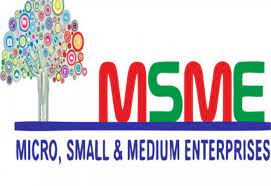MSMEs urged to formalise, join cooperatives to boost funding opportunities

An avid reader, analytical writer and consistent content creator with several enlightening articles and reports. He is currently a journalist , Commodities, Agriculture and Technology at business a.m. newspaper. Email: amugedavido@gmail.com. Tel: +234 706 930 4947
September 1, 2022473 views0 comments
Micro, Small and Medium Enterprises (MSMEs) in Nigeria have been urged to duly register and legally validate their businesses as well as form or join cooperatives or legalised associations in order to boost their chances of accessing funding.
 Business experts and stakeholders who spoke at the third edition of the Vanguard Economic Forum Series themed “Enhancing MSMEs’ Productivity and Growth in an Emerging Digital Economy”, said low level of access to finance was one of the key challenges hindering the growth of MSMEs and preventing them from playing their roles as critical engines of productivity in Nigeria’s economy.
Business experts and stakeholders who spoke at the third edition of the Vanguard Economic Forum Series themed “Enhancing MSMEs’ Productivity and Growth in an Emerging Digital Economy”, said low level of access to finance was one of the key challenges hindering the growth of MSMEs and preventing them from playing their roles as critical engines of productivity in Nigeria’s economy.
Speaking at the event held in Lagos, Kayode Pitan, managing director/chief executive officer, Bank of Industry Limited (BOI), citing a World Bank report, noted that MSMEs contribute between 40-55 percent of gross domestic product (GDP) and 50-80 percent of employment in most economies. He added that they are credited with about 85 percent of total industrial employment in Nigeria, an attestation to its significant contribution to the country’s economic development.
On the flip side, he observed that Nigerian MSMEs face challenges with accessing the finance required for them to grow, expand, and increase their output. He highlighted some of the factors hindering access to finance to include the highly unstructured nature of MSMEs as almost 90 percent are informal; high interest rates/long and tedious administrative processes; poor book-keeping practices/inadequate business recording; lack of credit history; insufficient collateral or guarantee; lack of bankable loan applications or poorly structured business plans; and a lack of awareness by a large number of SMEs of the different sources of funds available and how to access them.
Pitan said the MSME credit market is largely characterised by market failures and imperfections. He also noted that the financing gap for Nigerian MSMEs is estimated at about N617.3bn annually, according to data provided by PwC. He also disclosed that less than 5 percent of MSMEs have been able to access adequate financing for working capital and for funding expansion, according to a recent report by the National Bureau of Statistics (NBS).
Dwelling further on the challenges, he said about 48 percent of MSMEs in Nigeria leverage friends and family as the primary funding sources for their businesses, while small businesses accounted for a meagre percentage of the total commercial banking credit in the country.
On BOI’s role towards bridging the funding gap, he said the development finance institution is committed to transforming MSMEs by providing financial and business support services, providing financial assistance for the establishment of large, medium and small projects, as well as expansion, diversification and modernisation of enterprises and rehabilitation of existing ones.
To this end, he encouraged MSMEs to apply for funding on the bank’s platform, provided they meet the requirements.
Pitan encouraged entrepreneurs to boost their funding opportunities by ensuring their businesses are duly registered and legally validated. He also advised them to ensure their business operations are digitally visible and supported by MSME financing innovations such as Paga, Sabi, Kippa, among others.
Also speaking at the event, Akinwande Ademosu, chief executive officer/managing director, Credit Direct Limited, attributed the poor funding in MSMEs to inadequate financial infrastructure, inadequacies in risk management capabilities, weakness in management skills, collateral, and finance accounts.
“We must start seeing small income earners (the majority amongst us) and the Micro, Small and Medium Enterprises as potentially viable people, businesses, and market opportunities that can be served innovatively, proximately, digitally; people will be empowered, the national wealth and collective wellbeing will improve,” he said.
Ademosu encouraged entrepreneurs to boost their chances of getting funding by forming or joining cooperatives or legalised associations, noting that collective groups gain better chances of gaining access to funds from financial institutions.
According to him, the most potent funding source is still the financial system through the instrumentalities of financial institution distribution channels.
He, however, noted that the financial distribution channels have not been favourable to MSMEs, banks and other credit facilitators owing to difficult accessibility, adding that it has failed to emancipate entrepreneurs from economic failures.
Ademosu further alleged that the financial system has created setbacks to a couple of businesses who couldn’t thrive beyond their initial start-up owing to the unfriendly operations of the Nigerian financial system.
The Credit Direct chief executive advised MSMEs to ensure they maintain a good credit history, keep a well-documented finance account and also separate their business accounts from their private accounts. These, he noted, will enable financial institutions to access their businesses more efficiently and consequently, approve their funding requests.
